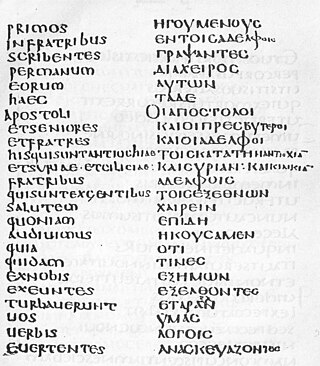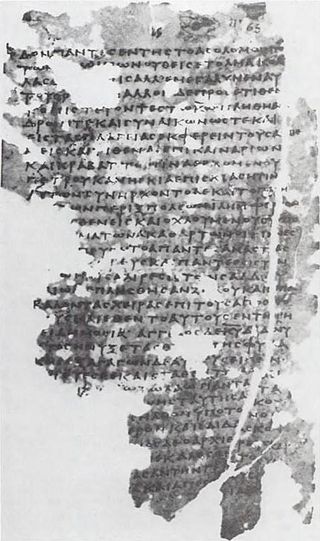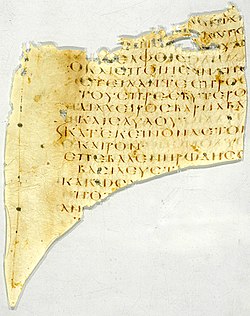
The Acts of the Apostles is the fifth book of the New Testament; it tells of the founding of the Christian Church and the spread of its message to the Roman Empire.

Barnabas, born Joseph (Ἰωσήφ) or Joses (Ἰωσής), was according to tradition an early Christian, one of the prominent Christian disciples in Jerusalem. According to Acts 4:36, Barnabas was a Cypriot Levite. Identified as an apostle in Acts 14:14, he and Paul the Apostle undertook missionary journeys together and defended Gentile converts against the Judaizers. They traveled together making more converts, and participated in the Council of Jerusalem. Barnabas and Paul successfully evangelized among the "God-fearing" Gentiles who attended synagogues in various Hellenized cities of Anatolia.

The Epistle to the Galatians is the ninth book of the New Testament. It is a letter from Paul the Apostle to a number of Early Christian communities in Galatia. Scholars have suggested that this is either the Roman province of Galatia in southern Anatolia, or a large region defined by Galatians, an ethnic group of Celtic people in central Anatolia. The letter was originally written in Koine Greek and later translated into other languages.

Paul also named Saul of Tarsus, commonly known as Paul the Apostle and Saint Paul, was a Christian apostle who spread the teachings of Jesus in the first-century world. For his contributions towards the New Testament, he is generally regarded as one of the most important figures of the Apostolic Age, and he also founded several Christian communities in Asia Minor and Europe from the mid-40s to the mid-50s AD.

Acts 15 is the fifteenth chapter of the Acts of the Apostles in the New Testament of the Christian Bible. It records "the first great controversy in the records of the Christian Church", concerning the necessity of circumcision, Paul and Barnabas traveling to Jerusalem to attend the Council of Jerusalem and the beginning of Paul's second missionary journey. The book containing this chapter is anonymous, but early Christian tradition uniformly affirmed that Luke composed this book as well as the Gospel of Luke.

Acts 12 is the twelfth chapter of the Acts of the Apostles in the New Testament of the Christian Bible. It records the death of the first apostle, James, son of Zebedee, followed by the miraculous escape of Peter from prison, the death of Herod Agrippa I, and the early ministry of Barnabas and Paul of Tarsus. The book containing this chapter is anonymous, but early Christian tradition uniformly affirmed that Luke composed this book as well as the Gospel of Luke.

Acts 10 is the tenth chapter of the Acts of the Apostles in the New Testament of the Christian Bible. The book containing this chapter is anonymous but early Christian tradition uniformly affirmed that Luke composed this book as well as the Gospel of Luke. This chapter records the vision of Saint Peter and his meeting with Cornelius in Caesarea.

Galatians 2 is the second chapter of the Epistle to the Galatians in the New Testament of the Christian Bible. It is authored by Paul the Apostle for the churches in Galatia, written between 49 and 58 AD. This chapter contains the meeting account of Paul, Barnabas and Christians in Jerusalem, considered "one of the most momentous events in the earliest Christianity", and the dispute between Paul and Peter.

Acts 5 is the fifth chapter of the Acts of the Apostles in the New Testament of the Christian Bible. It records the growth of the early church and the obstacles it encountered. The book containing this chapter is anonymous but early Christian tradition affirmed that Luke composed this book as well as the Gospel of Luke. The contents of this chapter include the history of Ananias and Sapphira, an account of the miraculous power and dignity of the Apostles, their imprisonment and liberation, examination before the Sanhedrin, and scourging, and finally Gamaliel's advice to the Sanhedrin.

Acts 8 is the eighth chapter of the Acts of the Apostles in the New Testament of the Christian Bible. It records the burial of Stephen, the beginnings of Christian persecution, the spread of the Gospel of Jesus Christ to the people of Samaria and the conversion of an Ethiopian official. The book containing this chapter is anonymous, but early Christian tradition uniformly affirmed that Luke composed this book as well as the Gospel of Luke. Parts of this chapter may have been drawn from an earlier "Philip cycle of stories" used by Luke in assembling his material.

Acts 9 is the ninth chapter of the Acts of the Apostles in the New Testament of the Christian Bible. It records Saul's conversion and the works of Saint Peter. The book containing this chapter is anonymous but early Christian tradition uniformly affirmed that Luke composed this book as well as the Gospel of Luke.

Acts 13 is the thirteenth chapter of the Acts of the Apostles in the New Testament of the Christian Bible. It records the first missionary journey of Paul and Barnabas to Cyprus and Pisidia. The book containing this chapter is anonymous, but early Christian tradition uniformly affirmed that Luke composed this book as well as the Gospel of Luke. From this point onwards, except for the Council held in Jerusalem, Luke's narrative focusses on Paul, his ministry, and the events of his life.

Acts 14 is the fourteenth chapter of the Acts of the Apostles in the New Testament of the Christian Bible. It records the first missionary journey of Paul and Barnabas to Phrygia and Lycaonia. The book containing this chapter is anonymous but early Christian tradition uniformly affirmed that Luke composed this book as well as the Gospel of Luke.

Acts 16 is the sixteenth chapter of the Acts of the Apostles in the New Testament of the Christian Bible. It records the start of the second missionary journey of Paul, together with Silas and Timothy. The book containing this chapter is anonymous, but early Christian tradition uniformly affirmed that Luke composed this book as well as the Gospel of Luke.
Acts 20 is the twentieth chapter of the Acts of the Apostles in the Christian New Testament of the Bible. It records the third missionary journey of Paul the Apostle. The narrator and his companions ("we") play an active part in the developments in this chapter. The book containing this chapter is anonymous, but early Christian tradition uniformly affirmed that Luke the Evangelist composed this book as well as the Gospel of Luke.

Acts 21 is the twenty-first chapter of the Acts of the Apostles in the New Testament of the Christian Bible. It records the end of Paul's third missionary journey and his arrival and reception in Jerusalem. The narrator and his companions ("we") play an active part in the developments in this chapter. The book containing this chapter is anonymous, but early Christian tradition uniformly affirmed that Luke composed this book as well as the Gospel of Luke.

Acts 22 is the twenty-second chapter of the Acts of the Apostles in the New Testament of the Christian Bible. It records the events leading to Paul's imprisonment in Jerusalem. The book containing this chapter is anonymous, but early Christian tradition uniformly affirmed that Luke composed this book as well as the Gospel of Luke.

Acts 23 is the twenty-third chapter of the Acts of the Apostles in the New Testament of the Christian Bible. It records the period of Paul's imprisonment in Jerusalem and then in Caesarea. The book containing this chapter is anonymous, but early Christian tradition uniformly affirmed that Luke composed this book as well as the Gospel of Luke.

Acts 26 is the twenty-sixth chapter of the Acts of the Apostles in the New Testament of the Christian Bible. It records the period of Paul's imprisonment in Caesarea. The book containing this chapter is anonymous, but Holman states that "uniform Christian tradition affirms that Luke wrote both" this book as well as the Gospel of Luke, as supported by Guthrie based on external evidence.

Galatians 1 is the first chapter of the Epistle to the Galatians in the New Testament of the Christian Bible. It is authored by Paul the Apostle for the churches in Galatia, written between 49 and 58 AD. This chapter contains Paul's significant exposition concerning the significance of what he says is God's revelation of Jesus Christ.














